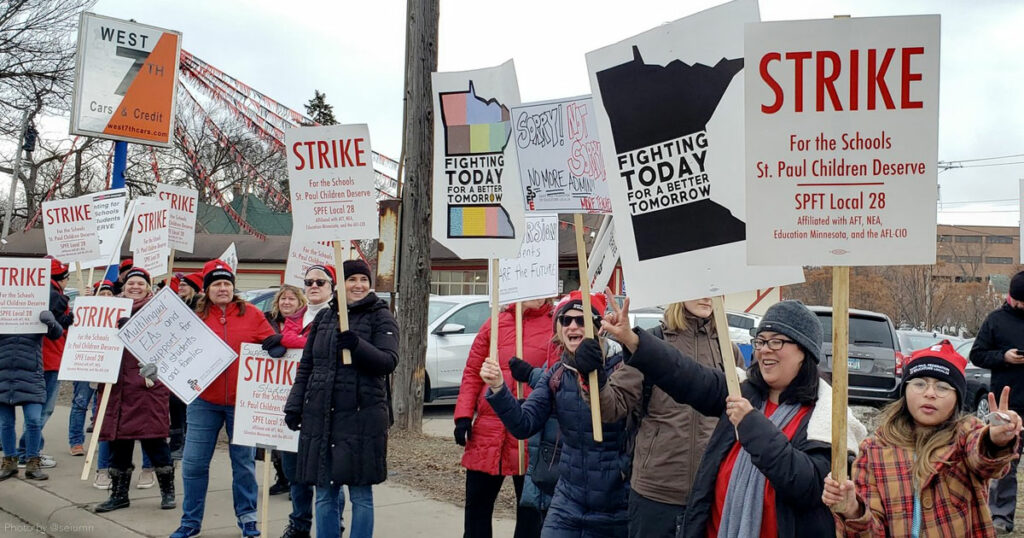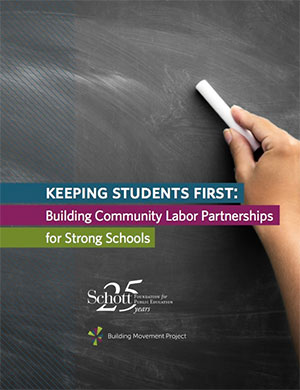Blog
St. Paul Educators are Striking Because their Students are Suffering

The dedicated educators in St. Paul, MN who went on strike Tuesday know full well that it takes wraparound supports for the city’s neediest children to have a fair and substantive opportunity to learn. They’ve gone on strike after ten months of failed contract negotiations because their students are suffering—and their #1 demand is more mental health supports. We see their fierce determination as an act of love.
St Paul, MN: public #schools are closed today, March 10, due to the @SPFE28 teacher’s union strike.
We spoke with some of the strikers, who told us their #1 demand is more #MentalHealth support for their students, some of whom “face tremendous trauma in their day-to-day lives.” pic.twitter.com/1dgtCOfxw5
— Unicorn Riot (@UR_Ninja) March 10, 2020
As Labor Notes reports:
“There are so many kids with so many issues,” said middle school teacher Leah Van Dassor. “Kids are depressed because they have problems at home. They don’t have anyone to talk to.”
St. Paul Federation of Educators (SPFE) Vice President Erica Schatzlein sees a wide range of needs in her work as an elementary teacher with English language learners.
“A students that had a parent pass away, instead of acting out, becomes completely withdrawn,” she said. A newly homeless student “has a meltdown, and I have to evacuate the classroom.”
In addition to its mental health demands, the union is asking for more bilingual teacher’s aides and limits on class size for special education.
“It’s too bad that all these important social services fall on the shoulder of the schools, but they do,” said Van Dassor, who is also on the bargaining team. “We have to try to figure out a way to help.”
To systematize this greater, holistic understanding of public schools and movements working to improve them, Schott released the Loving Cities Index. The Index measures access to 24 community and school-based supports, from clean air to unemployment, from healthy food to public transit.
Key measures in the Loving Cities Index include in-school support staff and mental health supports — and it’s going to take broad and dynamic grassroots movements to move the needle.
Demands like these are part and parcel of a longstanding grassroots effort to create sustainable community schools: public schools that are the beating heart of neighborhoods, schools that provide not just a high-quality education for every student but also the wrap-around supports needed to help address the myriad out-of-school factors that impact a child’s achievement.
For years, St. Paul has been a beacon of cross-sector collaboration and organizing. Schott recently teamed up with Building Movement Project to examine what makes successful community-labor partnerships work. The product is the toolkit Keeping Students First: Building Community Labor Partnerships for Strong Schools, which contains case studies, resources, and sample activities for cross-sector groups to undertake together to strengthen and grow their joint efforts. St. Paul was selected as the first of those case studies. As we wrote then, these alliances aren’t easily won, but are incredibly important:
 It was equally vital that union and community leaders earned each other’s trust by cultivating their personal relationships. In the case of one community partner in St. Paul who works with youth of color, the personal relationship cultivated with SPFT leadership allowed the community partner to act as a mediator between the union and representatives from the Black community, who had felt historically shut out from a relationship with teachers in the schools and who, in many cases, were hesitant to hear what the union leadership had to say. The community leader acknowledged the real and historical barriers between mostly white teachers and students of color, but also emphasized the necessity of building relationships since, “These are teachers that are in the classroom overseeing our children.”
It was equally vital that union and community leaders earned each other’s trust by cultivating their personal relationships. In the case of one community partner in St. Paul who works with youth of color, the personal relationship cultivated with SPFT leadership allowed the community partner to act as a mediator between the union and representatives from the Black community, who had felt historically shut out from a relationship with teachers in the schools and who, in many cases, were hesitant to hear what the union leadership had to say. The community leader acknowledged the real and historical barriers between mostly white teachers and students of color, but also emphasized the necessity of building relationships since, “These are teachers that are in the classroom overseeing our children.”
The Schott Foundation has since its founding built bridges across multiple constituencies, organizations and advocates in the greater education justice movement — many of whom didn’t necessarily see eye-to-eye. Community-labor alliances, as we’ve seen in St. Paul and other cities like Chicago and Los Angeles, are the best way to build material gains for students, parents, educators, and the neighborhoods they live in.


